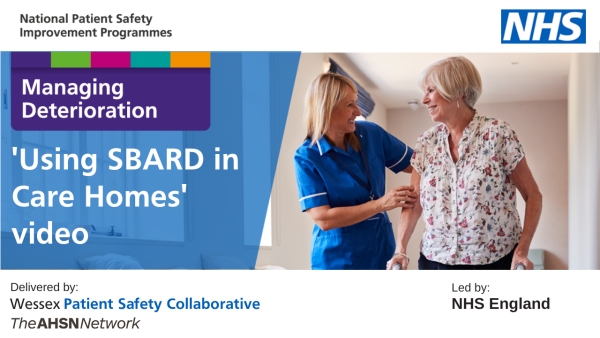What was delivered in 2022-23?
Our managing deterioration programme supported our systems to sustain deterioration management tools in 54% (481) of care homes in Wessex. We also worked with Hampshire and Isle of Wight (HIOW) Integrated Care Board (ICB) to develop a new training video to support staff in care homes with patient safety communication techniques.

Video: Using SBARD in Care Homes
We completed year one of our two-year workplan for our medicines safety improvement programme, which included working with the NHS Business Service Authority to develop the Opioids Comparators dashboard. The dashboard promotes medicines safety by:
In October 2022, a second version of the dashboard was released, using validated primary care prescribing data in ePACT2, an online business intelligence tool. The dashboard enables GP practices, PCNs, ICBs, NHS regions and AHSNs to review trends in data over time and see the impact of activities in this complex area of reducing harm from opioid prescribing. To support this work, we also produced three podcasts to showcase local improvement initiatives that have contributed to reducing opioid prescriptions.
We continued delivery of our maternity and neonatal safety programme, working with all seven acute trusts in our region to improve adherence to the pre-term optimisation bundle (seven evidence-based elements), and develop a community of practice to implement national early warning scores for maternity and newborns.
We also produced the Wessex Antenatal Care Pathways in digital format which lends itself to our regions digital workstream, supporting the Wessex wide transition to digital maternity records. These care pathways are embedded into the Southampton, Hampshire, Isle of Wight and Portsmouth Local Maternity System (SHIP LMS) telephone triage processes, the Healthier Together triage app, the Wessex Healthier Together website and all seven maternity trusts. This facilitates a standardised approach in early recognition and management of deterioration.
In addition, we sourced £100,000 to support the four trusts in Hampshire and the Isle of Wight to pilot a team coaching programme for their pre-term optimisation teams. This will be evaluated in 2023-24.
Headlines from our 2022-23 optimisation pathway work include:
Our mental health safety programme supported 22 mental health in-patient wards to reduce the incidence of restrictive practice (including the review of unnecessary rules or limitations, and improving the ward routines to meet patient preferences). This equates to 40% of eligible mental health in-patient wards in Wessex, against an ambition of 10%.
We continued delivery of our system safety programme, supporting all acute, community and mental health trusts in Wessex, plus ICBs and regional teams in Dorset and HIOW, with the implementation of the Patient Safety Incident Response Framework (PSIRF). This framework outlines how organisations should respond to incidents and supports shared learning and improvement.
We held 16 events and webinars, with a total of 553 attendees.
We produced 23 case studies to summarise our improvement work across the five programmes.
We gained 658 subscribers to our quarterly quality improvement newsletter called CSQIP (Community of Safety, Quality and Improvement Practice).
Videos
Resources and Links
Patient Safety programme case studies
Medicine safety improvement programme
Podcast: Opioid Podcast with Dr Cathy Price
Maternity and neonatal safety improvement programme
Managing deterioration safety improvement programme
Mental health safety improvement programme
Community of Safety, Quality and Improvement Practice (CSQIP) newsletter